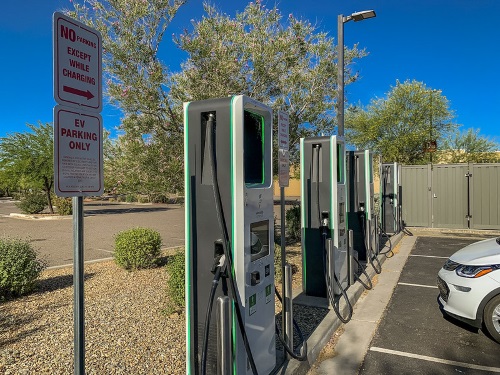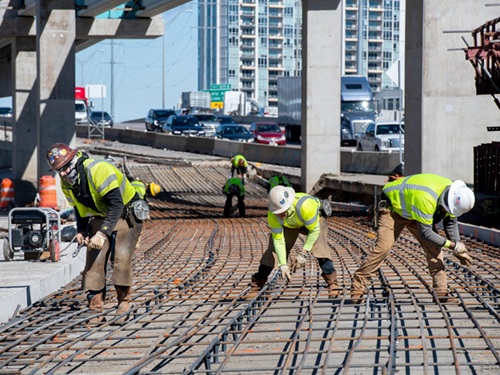The White House recently unveiled the “next steps” being undertaken in an effort to build a national network of 500,000 electric vehicle or EV chargers by 2030, constructed with largely American-sourced materials.
[Above photo by the Arizona DOT]
Those “next steps” include establishing “minimum standards” for federally funded EV infrastructure, finalizing new “Build America, Buy America” rules for EV charging equipment, and opening a $2.5 billion grant program to help cities, towns, tribes, and states build EV charging stations in communities across the country.

First, the Federal Highway Administration recently submitted its final rule for the $5 billion National Electric Vehicle Charging Infrastructure or NEVI program that established standards for the construction of an EV charging network. The NEVI program is funded in part through the $1.2 trillion Infrastructure Investment and Jobs Act or IIJA enacted in November 2021
Concurrently, FHWA submitted a final rule governing “Build America, Buy America” construction material acquisition requirements for those EV chargers. The agency noted that its “Build America, Buy America” implementation plan provides incentives to domestically produce EV charging components, while providing a transition period for companies to onshore their supply chains to make high-quality, “Made-in-America” compliant chargers while creating domestic manufacturing jobs.

“The national standards we are announcing today will give EV users confidence that they will be able to find available, safe and reliable EV charging stations across the country,” noted FHWA Administrator Shailen Bhatt in a statement.
“This is a critical step in building a seamless national network with common requirements for EV charging that will support the widespread adoption of electric vehicles, help build a clean energy, and ensure those technologies and products are made here in America,” he added.
Meanwhile, the new Charging and Fueling Infrastructure or CFI grant program established by the IIJA will provide $2.5 billion over five years to a full range of applicants, including cities, counties, local governments, and tribes.

This round of funding will open soon, making $700 million from fiscal years 2022 and 2023 available to “strategically” deploy EV charging infrastructure and other fueling infrastructure projects in urban and rural communities in publicly accessible locations, including downtown areas and local neighborhoods – particularly in “underserved and disadvantaged communities,” FHWA noted.
“We look forward to opening applications for community-based charging grants soon,” FHWA’s Bhatt said.
FHWA added that, in coordination with the Joint Office of Energy and Transportation or JOET – an office overseen by both the U.S. Department of Transportation and U.S. Department of Energy – it plans to conduct outreach and provide technical assistance via multiple webinars in February and March.
FHWA and JOET said they also plan to continue providing direct technical assistance to support states and communities as they build EV charging infrastructure.



